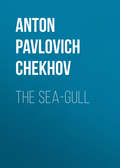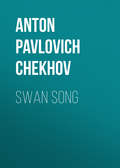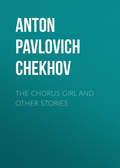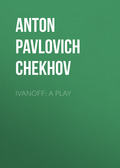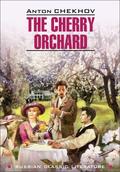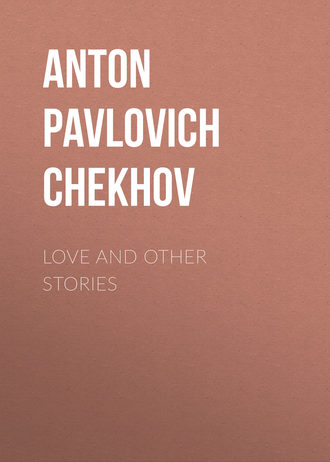
Антон Чехов
Love and Other Stories
AN INQUIRY
IT was midday. Voldyrev, a tall, thick-set country gentleman with a cropped head and prominent eyes, took off his overcoat, mopped his brow with his silk handkerchief, and somewhat diffidently went into the government office. There they were scratching away..
"Where can I make an inquiry here?" he said, addressing a porter who was bringing a trayful of glasses from the furthest recesses of the office. "I have to make an inquiry here and to take a copy of a resolution of the Council."
"That way please! To that one sitting near the window!" said the porter, indicating with the tray the furthest window. Voldyrev coughed and went towards the window; there, at a green table spotted like typhus, was sitting a young man with his hair standing up in four tufts on his head, with a long pimply nose, and a long faded uniform. He was writing, thrusting his long nose into the papers. A fly was walking about near his right nostril, and he was continually stretching out his lower lip and blowing under his nose, which gave his face an extremely care-worn expression.
"May I make an inquiry about my case here.. of you? My name is Voldyrev. and, by the way, I have to take a copy of the resolution of the Council of the second of March."
The clerk dipped his pen in the ink and looked to see if he had got too much on it. Having satisfied himself that the pen would not make a blot, he began scribbling away. His lip was thrust out, but it was no longer necessary to blow: the fly had settled on his ear.
"Can I make an inquiry here?" Voldyrev repeated a minute later, "my name is Voldyrev, I am a landowner.."
"Ivan Alexeitch!" the clerk shouted into the air as though he had not observed Voldyrev, "will you tell the merchant Yalikov when he comes to sign the copy of the complaint lodged with the police! I've told him a thousand times!"
"I have come in reference to my lawsuit with the heirs of Princess Gugulin," muttered Voldyrev. "The case is well known. I earnestly beg you to attend to me."
Still failing to observe Voldyrev, the clerk caught the fly on his lip, looked at it attentively and flung it away. The country gentleman coughed and blew his nose loudly on his checked pocket handkerchief. But this was no use either. He was still unheard. The silence lasted for two minutes. Voldyrev took a rouble note from his pocket and laid it on an open book before the clerk. The clerk wrinkled up his forehead, drew the book towards him with an anxious air and closed it.
"A little inquiry… I want only to find out on what grounds the heirs of Princess Gugulin… May I trouble you?"
The clerk, absorbed in his own thoughts, got up and, scratching his elbow, went to a cupboard for something. Returning a minute later to his table he became absorbed in the book again: another rouble note was lying upon it.
"I will trouble you for one minute only… I have only to make an inquiry."
The clerk did not hear, he had begun copying something.
Voldyrev frowned and looked hopelessly at the whole scribbling brotherhood.
"They write!" he thought, sighing. "They write, the devil take them entirely!"
He walked away from the table and stopped in the middle of the room, his hands hanging hopelessly at his sides. The porter, passing again with glasses, probably noticed the helpless expression of his face, for he went close up to him and asked him in a low voice:
"Well? Have you inquired?"
"I've inquired, but he wouldn't speak to me."
"You give him three roubles," whispered the porter.
"I've given him two already."
"Give him another."
Voldyrev went back to the table and laid a green note on the open book.
The clerk drew the book towards him again and began turning over the leaves, and all at once, as though by chance, lifted his eyes to Voldyrev. His nose began to shine, turned red, and wrinkled up in a grin.
"Ah.. what do you want?" he asked.
"I want to make an inquiry in reference to my case… My name is Voldyrev."
"With pleasure! The Gugulin case, isn't it? Very good. What is it then exactly?"
Voldyrev explained his business.
The clerk became as lively as though he were whirled round by a hurricane. He gave the necessary information, arranged for a copy to be made, gave the petitioner a chair, and all in one instant. He even spoke about the weather and asked after the harvest. And when Voldyrev went away he accompanied him down the stairs, smiling affably and respectfully, and looking as though he were ready any minute to fall on his face before the gentleman. Voldyrev for some reason felt uncomfortable, and in obedience to some inward impulse he took a rouble out of his pocket and gave it to the clerk. And the latter kept bowing and smiling, and took the rouble like a conjuror, so that it seemed to flash through the air.
"Well, what people!" thought the country gentleman as he went out into the street, and he stopped and mopped his brow with his handkerchief.
MARTYRS
LIZOTCHKA KUDRINSKY, a young married lady who had many admirers, was suddenly taken ill, and so seriously that her husband did not go to his office, and a telegram was sent to her mamma at Tver. This is how she told the story of her illness:
"I went to Lyesnoe to auntie's. I stayed there a week and then I went with all the rest to cousin Varya's. Varya's husband is a surly brute and a despot (I'd shoot a husband like that), but we had a very jolly time there. To begin with I took part in some private theatricals. It was A Scandal in a Respectable Family. Hrustalev acted marvellously! Between the acts I drank some cold, awfully cold, lemon squash, with the tiniest nip of brandy in it. Lemon squash with brandy in it is very much like champagne… I drank it and I felt nothing. Next day after the performance I rode out on horseback with that Adolf Ivanitch. It was rather damp and there was a strong wind. It was most likely then that I caught cold. Three days later I came home to see how my dear, good Vassya was getting on, and while here to get my silk dress, the one that has little flowers on it. Vassya, of course, I did not find at home. I went into the kitchen to tell Praskovya to set the samovar, and there I saw on the table some pretty little carrots and turnips like playthings. I ate one little carrot and well, a turnip too. I ate very little, but only fancy, I began having a sharp pain at once – spasms.. spasms.. spasms.. ah, I am dying. Vassya runs from the office. Naturally he clutches at his hair and turns white. They run for the doctor… Do you understand, I am dying, dying."
The spasms began at midday, before three o'clock the doctor came, and at six Lizotchka fell asleep and slept soundly till two o'clock in the morning.
It strikes two… The light of the little night lamp filters scantily through the pale blue shade. Lizotchka is lying in bed, her white lace cap stands out sharply against the dark background of the red cushion. Shadows from the blue lamp-shade lie in patterns on her pale face and her round plump shoulders. Vassily Stepanovitch is sitting at her feet. The poor fellow is happy that his wife is at home at last, and at the same time he is terribly alarmed by her illness.
"Well, how do you feel, Lizotchka?" he asks in a whisper, noticing that she is awake.
"I am better," moans Lizotchka. "I don't feel the spasms now, but there is no sleeping… I can't get to sleep!"
"Isn't it time to change the compress, my angel?"
Lizotchka sits up slowly with the expression of a martyr and gracefully turns her head on one side. Vassily Stepanovitch with reverent awe, scarcely touching her hot body with his fingers, changes the compress. Lizotchka shrinks, laughs at the cold water which tickles her, and lies down again.
"You are getting no sleep, poor boy!" she moans.
"As though I could sleep!"
"It's my nerves, Vassya, I am a very nervous woman. The doctor has prescribed for stomach trouble, but I feel that he doesn't understand my illness. It's nerves and not the stomach, I swear that it is my nerves. There is only one thing I am afraid of, that my illness may take a bad turn."
"No, Lizotchka, no, to-morrow you will be all right!"
"Hardly likely! I am not afraid for myself… I don't care, indeed, I shall be glad to die, but I am sorry for you! You'll be a widower and left all alone."
Vassitchka rarely enjoys his wife's society, and has long been used to solitude, but Lizotchka's words agitate him.
"Goodness knows what you are saying, little woman! Why these gloomy thoughts?"
"Well, you will cry and grieve, and then you will get used to it.
You'll even get married again."
The husband clutches his head.
"There, there, I won't!" Lizotchka soothes him, "only you ought to be prepared for anything."
"And all of a sudden I shall die," she thinks, shutting her eyes.
And Lizotchka draws a mental picture of her own death, how her mother, her husband, her cousin Varya with her husband, her relations, the admirers of her "talent" press round her death bed, as she whispers her last farewell. All are weeping. Then when she is dead they dress her, interestingly pale and dark-haired, in a pink dress (it suits her) and lay her in a very expensive coffin on gold legs, full of flowers. There is a smell of incense, the candles splutter. Her husband never leaves the coffin, while the admirers of her talent cannot take their eyes off her, and say: "As though living! She is lovely in her coffin!" The whole town is talking of the life cut short so prematurely. But now they are carrying her to the church. The bearers are Ivan Petrovitch, Adolf Ivanitch, Varya's husband, Nikolay Semyonitch, and the black-eyed student who had taught her to drink lemon squash with brandy. It's only a pity there's no music playing. After the burial service comes the leave-taking. The church is full of sobs, they bring the lid with tassels, and.. Lizotchka is shut off from the light of day for ever, there is the sound of hammering nails. Knock, knock, knock.
Lizotchka shudders and opens her eyes.
"Vassya, are you here?" she asks. "I have such gloomy thoughts. Goodness, why am I so unlucky as not to sleep. Vassya, have pity, do tell me something!"
"What shall I tell you?"
"Something about love," Lizotchka says languidly. "Or some anecdote about Jews.."
Vassily Stepanovitch, ready for anything if only his wife will be cheerful and not talk about death, combs locks of hair over his ears, makes an absurd face, and goes up to Lizotchka.
"Does your vatch vant mending?" he asks.
"It does, it does," giggles Lizotchka, and hands him her gold watch from the little table. "Mend it."
Vassya takes the watch, examines the mechanism for a long time, and wriggling and shrugging, says: "She can not be mended.. in vun veel two cogs are vanting.."
This is the whole performance. Lizotchka laughs and claps her hands.
"Capital," she exclaims. "Wonderful. Do you know, Vassya, it's awfully stupid of you not to take part in amateur theatricals! You have a remarkable talent! You are much better than Sysunov. There was an amateur called Sysunov who played with us in It's My Birthday. A first-class comic talent, only fancy: a nose as thick as a parsnip, green eyes, and he walks like a crane… We all roared; stay, I will show you how he walks."
Lizotchka springs out of bed and begins pacing about the floor, barefooted and without her cap.
"A very good day to you!" she says in a bass, imitating a man's voice. "Anything pretty? Anything new under the moon? Ha, ha, ha!" she laughs.
"Ha, ha, ha!" Vassya seconds her. And the young pair, roaring with laughter, forgetting the illness, chase one another about the room. The race ends in Vassya's catching his wife by her nightgown and eagerly showering kisses upon her. After one particularly passionate embrace Lizotchka suddenly remembers that she is seriously ill..
"What silliness!" she says, making a serious face and covering herself with the quilt. "I suppose you have forgotten that I am ill! Clever, I must say!"
"Sorry." falters her husband in confusion.
"If my illness takes a bad turn it will be your fault. Not kind! not good!"
Lizotchka closes her eyes and is silent. Her former languor and expression of martyrdom return again, there is a sound of gentle moans. Vassya changes the compress, and glad that his wife is at home and not gadding off to her aunt's, sits meekly at her feet. He does not sleep all night. At ten o'clock the doctor comes.
"Well, how are we feeling?" he asks as he takes her pulse. "Have you slept?"
"Badly," Lizotchka's husband answers for her, "very badly."
The doctor walks away to the window and stares at a passing chimney-sweep.
"Doctor, may I have coffee to-day?" asks Lizotchka.
"You may."
"And may I get up?"
"You might, perhaps, but.. you had better lie in bed another day."
"She is awfully depressed," Vassya whispers in his ear, "such gloomy thoughts, such pessimism. I am dreadfully uneasy about her."
The doctor sits down to the little table, and rubbing his forehead, prescribes bromide of potassium for Lizotchka, then makes his bow, and promising to look in again in the evening, departs. Vassya does not go to the office, but sits all day at his wife's feet.
At midday the admirers of her talent arrive in a crowd. They are agitated and alarmed, they bring masses of flowers and French novels. Lizotchka, in a snow-white cap and a light dressing jacket, lies in bed with an enigmatic look, as though she did not believe in her own recovery. The admirers of her talent see her husband, but readily forgive his presence: they and he are united by one calamity at that bedside!
At six o'clock in the evening Lizotchka falls asleep, and again sleeps till two o'clock in the morning. Vassya as before sits at her feet, struggles with drowsiness, changes her compress, plays at being a Jew, and in the morning after a second night of suffering, Liza is prinking before the looking-glass and putting on her hat.
"Wherever are you going, my dear?" asks Vassya, with an imploring look at her.
"What?" says Lizotchka in wonder, assuming a scared expression, "don't you know that there is a rehearsal to-day at Marya Lvovna's?"
After escorting her there, Vassya having nothing to do to while away his boredom, takes his portfolio and goes to the office. His head aches so violently from his sleepless nights that his left eye shuts of itself and refuses to open..
"What's the matter with you, my good sir?" his chief asks him. "What is it?"
Vassya waves his hand and sits down.
"Don't ask me, your Excellency," he says with a sigh. "What I have suffered in these two days, what I have suffered! Liza has been ill!"
"Good heavens," cried his chief in alarm. "Lizaveta Pavlovna, what is wrong with her?"
Vassily Stepanovitch merely throws up his hands and raises his eyes to the ceiling, as though he would say: "It's the will of Providence."
"Ah, my boy, I can sympathise with you with all my heart!" sighs
his chief, rolling his eyes. "I've lost my wife, my dear, I understand.
That is a loss, it is a loss! It's awful, awful! I hope Lizaveta
Pavlovna is better now! What doctor is attending her?"
"Von Schterk."
"Von Schterk! But you would have been better to have called in Magnus or Semandritsky. But how very pale your face is. You are ill yourself! This is awful!"
"Yes, your Excellency, I haven't slept. What I have suffered, what
I have been through!"
"And yet you came! Why you came I can't understand? One can't force oneself like that! One mustn't do oneself harm like that. Go home and stay there till you are well again! Go home, I command you! Zeal is a very fine thing in a young official, but you mustn't forget as the Romans used to say: 'mens sana in corpore sano,' that is, a healthy brain in a healthy body."
Vassya agrees, puts his papers back in his portfolio, and, taking leave of his chief, goes home to bed.
THE LION AND THE SUN
IN one of the towns lying on this side of the Urals a rumour was afloat that a Persian magnate, called Rahat-Helam, was staying for a few days in the town and putting up at the "Japan Hotel." This rumour made no impression whatever upon the inhabitants; a Persian had arrived, well, so be it. Only Stepan Ivanovitch Kutsyn, the mayor of the town, hearing of the arrival of the oriental gentleman from the secretary of the Town Hall, grew thoughtful and inquired:
"Where is he going?"
"To Paris or to London, I believe."
"H'm… Then he is a big-wig, I suppose?"
"The devil only knows."
As he went home from the Town Hall and had his dinner, the mayor sank into thought again, and this time he went on thinking till the evening. The arrival of the distinguished Persian greatly intrigued him. It seemed to him that fate itself had sent him this Rahat-Helam, and that a favourable opportunity had come at last for realising his passionate, secretly cherished dream. Kutsyn had already two medals, and the Stanislav of the third degree, the badge of the Red Cross, and the badge of the Society of Saving from Drowning, and in addition to these he had made himself a little gold gun crossed by a guitar, and this ornament, hung from a buttonhole in his uniform, looked in the distance like something special, and delightfully resembled a badge of distinction. It is well known that the more orders and medals you have the more you want – and the mayor had long been desirous of receiving the Persian order of The Lion and the Sun; he desired it passionately, madly. He knew very well that there was no need to fight, or to subscribe to an asylum, or to serve on committees to obtain this order; all that was needed was a favourable opportunity. And now it seemed to him that this opportunity had come.
At noon on the following day he put on his chain and all his badges of distinction and went to the 'Japan.' Destiny favoured him. When he entered the distinguished Persian's apartment the latter was alone and doing nothing. Rahat-Helam, an enormous Asiatic, with a long nose like the beak of a snipe, with prominent eyes, and with a fez on his head, was sitting on the floor rummaging in his portmanteau.
"I beg you to excuse my disturbing you," began Kutsyn, smiling. "I have the honour to introduce myself, the hereditary, honourable citizen and cavalier, Stepan Ivanovitch Kutsyn, mayor of this town. I regard it as my duty to honour, in the person of your Highness, so to say, the representative of a friendly and neighbourly state."
The Persian turned and muttered something in very bad French, that sounded like tapping a board with a piece of wood.
"The frontiers of Persia" – Kutsyn continued the greeting he had previously learned by heart – "are in close contact with the borders of our spacious fatherland, and therefore mutual sympathies impel me, so to speak, to express my solidarity with you."
The illustrious Persian got up and again muttered something in a wooden tongue. Kutsyn, who knew no foreign language, shook his head to show that he did not understand.
"Well, how am I to talk to him?" he thought. "It would be a good thing to send for an interpreter at once, but it is a delicate matter, I can't talk before witnesses. The interpreter would be chattering all over the town afterwards."
And Kutsyn tried to recall the foreign words he had picked up from the newspapers.
"I am the mayor of the town," he muttered. "That is the lord mayor.. municipalais.. Vwee? Kompreney?"
He wanted to express his social position in words or in gesture, and did not know how. A picture hanging on the wall with an inscription in large letters, "The Town of Venice," helped him out of his difficulties. He pointed with his finger at the town, then at his own head, and in that way obtained, as he imagined, the phrase: "I am the head of the town." The Persian did not understand, but he gave a smile, and said:
"Goot, monsieur.. goot.." Half-an-hour later the mayor was slapping the Persian, first on the knee and then on the shoulder, and saying:
"Kompreney? Vwee? As lord mayor and municipalais I suggest that you should take a little promenage.. kompreney? Promenage."
Kutsyn pointed at Venice, and with two fingers represented walking legs. Rahat-Helam who kept his eyes fixed on his medals, and was apparently guessing that this was the most important person in the town, understood the word promenage and grinned politely. Then they both put on their coats and went out of the room. Downstairs near the door leading to the restaurant of the 'Japan,' Kutsyn reflected that it would not be amiss to entertain the Persian. He stopped and indicating the tables, said:
"By Russian custom it wouldn't be amiss.. puree, entrekot, champagne and so on, kompreney."
The illustrious visitor understood, and a little later they were both sitting in the very best room of the restaurant, eating, and drinking champagne.
"Let us drink to the prosperity of Persia!" said Kutsyn. "We Russians love the Persians. Though we are of another faith, yet there are common interests, mutual, so to say, sympathies.. progress.. Asiatic markets… The campaigns of peace so to say.."
The illustrious Persian ate and drank with an excellent appetite, he stuck his fork into a slice of smoked sturgeon, and wagging his head, enthusiastically said: "Goot, bien."
"You like it?" said the mayor delighted. "Bien, that's capital."
And turning to the waiter he said: "Luka, my lad, see that two pieces of smoked sturgeon, the best you have, are sent up to his
Highness's room!"
Then the mayor and the Persian magnate went to look at the menagerie. The townspeople saw their Stepan Ivanovitch, flushed with champagne, gay and very well pleased, leading the Persian about the principal streets and the bazaar, showing him the points of interest of the town, and even taking him to the fire tower.
Among other things the townspeople saw him stop near some stone gates with lions on it, and point out to the Persian first the lion, then the sun overhead, and then his own breast; then again he pointed to the lion and to the sun while the Persian nodded his head as though in sign of assent, and smiling showed his white teeth. In the evening they were sitting in the London Hotel listening to the harp-players, and where they spent the night is not known.
Next day the mayor was at the Town Hall in the morning; the officials there apparently already knew something and were making their conjectures, for the secretary went up to him and said with an ironical smile:
"It is the custom of the Persians when an illustrious visitor comes to visit you, you must slaughter a sheep with your own hands."
And a little later an envelope that had come by post was handed to him. The mayor tore it open and saw a caricature in it. It was a drawing of Rahat-Helam with the mayor on his knees before him, stretching out his hands and saying:
"To prove our Russian friendship
For Persia's mighty realm,
And show respect for you, her envoy,
Myself I'd slaughter like a lamb,
But, pardon me, for I'm a – donkey!"
The mayor was conscious of an unpleasant feeling like a gnawing in the pit of the stomach, but not for long. By midday he was again with the illustrious Persian, again he was regaling him and showing him the points of interest in the town. Again he led him to the stone gates, and again pointed to the lion, to the sun and to his own breast. They dined at the 'Japan'; after dinner, with cigars in their teeth, both, flushed and blissful, again mounted the fire tower, and the mayor, evidently wishing to entertain the visitor with an unusual spectacle, shouted from the top to a sentry walking below:
"Sound the alarm!"
But the alarm was not sounded as the firemen were at the baths at the moment.
They supped at the 'London' and, after supper, the Persian departed. When he saw him off, Stepan Ivanovitch kissed him three times after the Russian fashion, and even grew tearful. And when the train started, he shouted:
"Give our greeting to Persia! Tell her that we love her!"
A year and four months had passed. There was a bitter frost, thirty-five degrees, and a piercing wind was blowing. Stepan Ivanovitch was walking along the street with his fur coat thrown open over his chest, and he was annoyed that he met no one to see the Lion and the Sun upon his breast. He walked about like this till evening with his fur coat open, was chilled to the bone, and at night tossed from side to side and could not get to sleep.
He felt heavy at heart.
There was a burning sensation inside him, and his heart throbbed uneasily; he had a longing now to get a Serbian order. It was a painful, passionate longing.



